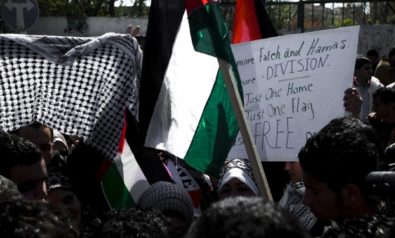
A brief background of the Israeli-Palestinian conflict, as Abbas seeks to gain UN recognition.
Following the withdrawal of the British from Mandate Palestine, the UN vote on the partition of Palestine into separate Arab and Jewish states (along with the subsequent rejection of this by Arab nations) and the declaration of the state of Israel in 1948, the Middle East has been characterised by ongoing conflict up to the present day, involving war, uprisings and acts of terrorism.
During the 1948 Arab-Israeli war, involving Israel and many neighbouring Arab countries, approximately 700-750,000 Palestinians were either forcefully expelled and/or had to flee their homes.
The UN Resolution 194 states: “refugees wishing to return to their homes and live at peace with their neighbours should be permitted to do so”. Israel contests what has come to be called the ‘right of return’, arguing that it would, if implemented in full, end the Jewish character of the state.
Wars continued to occur between Israel and their Arab neighbours, following 1948, including with Egypt, Jordan, Syria and Palestinian fighters. During the 1967 six day war, Israel conquered East Jerusalem (which they later annexed), the West Bank, Gaza, the Sinai and the Golan Heights. The Sinai was later returned to Egypt following the signing of a peace treaty by Anwar el-Sadat prior to his assassination. Gaza saw the withdrawal of Israeli soldiers and settlers in 2005, but was later blockaded by Israel and Egypt from 2007. The Golan Heights is also considered occupied territory and was seized from Syria in the 1967 War.
The UN considers the lands seized in 1967 by Israel to be occupied territories, whilst UN Resolution 242 also demands the “withdrawal of Israeli armed forces from territories occupied in the recent [1967] conflict” and the recognition of every state’s “right to live in peace within secure and recognizable boundaries”.
Despite the peace treaties between Egypt and Jordan with Israel, peace between the Palestinians and Israelis has remained distant. Following attempts to achieve peace by past US presidents, which peaked during the historic 2002 Camp David Summit bringing together Israeli Prime Minister Ehud Barak and Palestinian Authority Chairman Yasser Arafat, Barack Obama failed in September 2010. Notably, past negotiations have often seen both sides blame each other for the breakdown of talks. The negotiations of 2010 between the Israelis and Palestinians quickly broke down following the expiration of a freeze of settlements in the Occupied Palestinian Territories. Israel has settlements in both East Jerusalem and the West Bank which are classed as illegal under international law.
The Palestinian Authority (PA), headed by President Mahmoud Abbas governs small portions of the West Bank whilst the land and sea blockaded Gaza is run by Hamas. Following the 2006 elections, which saw an overwhelming victory for Hamas, a brief but bitter civil war broke out between Hamas and Fatah (the main faction to make up the PA). This resulted in a West Bank governed by Fatah, whilst Hamas seized Gaza, which meant the two main factions were at political odds. However, the split Palestinian factions agreed to sign a preliminary unity pact in 2011, following the beginnings of the Arab Uprisings earlier in the year. Notably, the Gaza Strip saw the withdrawal of the Israeli military and settlers in 2005, but was later blockaded by Israel and Egypt in 2007.
Israel, the US and EU nations consider Hamas to be a terrorist organisation, with whom they cannot enter peace talks. Other states, such as Turkey, Russia, and Switzerland, do not formally consider Hamas a terrorist organisation. The Israeli government holds the view that peace talks with the political faction Hamas are impossible because the latter has in the past, and in its charter, called for the destruction of Israel. Israel also contends that Hamas does not acknowledge the state’s right to exist. However, this has been disputed by Hamas officials such as Khaled Mesha'al, the Islamist group's leader.
Meanwhile amidst the indefinitely stalled peace talks with Israel, due to settlement construction and Palestinian pre-conditions of a renewed moratoriam on settlements, Abbas has decided to seek UN recognition of a Palestinian state based upon the 1967 borders in the coming September. The borders of the 1967 territories include East Jerusalem – which the Palestinian people see as their future capital – the West Bank and Gaza. Israeli PM Binyamin Netanyahu and US President Barack Obama have warned Abbas against taking such actions, to avoid Israel becoming isolated in the international community. They argue that the borders of a future Palestinian state (and, by implication, Israel) ought to result from a process of negotiation. Both the US and Israel have threatened the PA, though it appears likely to proceed.
For more than 10 years, Fair Observer has been free, fair and independent. No billionaire owns us, no advertisers control us. We are a reader-supported nonprofit. Unlike many other publications, we keep our content free for readers regardless of where they live or whether they can afford to pay. We have no paywalls and no ads.
In the post-truth era of fake news, echo chambers and filter bubbles, we publish a plurality of perspectives from around the world. Anyone can publish with us, but everyone goes through a rigorous editorial process. So, you get fact-checked, well-reasoned content instead of noise.
We publish 2,500+ voices from 90+ countries. We also conduct education and training programs on subjects ranging from digital media and journalism to writing and critical thinking. This doesn’t come cheap. Servers, editors, trainers and web developers cost money.
Please consider supporting us on a regular basis as a recurring donor or a sustaining member.
Support Fair Observer
We rely on your support for our independence, diversity and quality.
Will you support FO’s journalism?
We rely on your support for our independence, diversity and quality.





